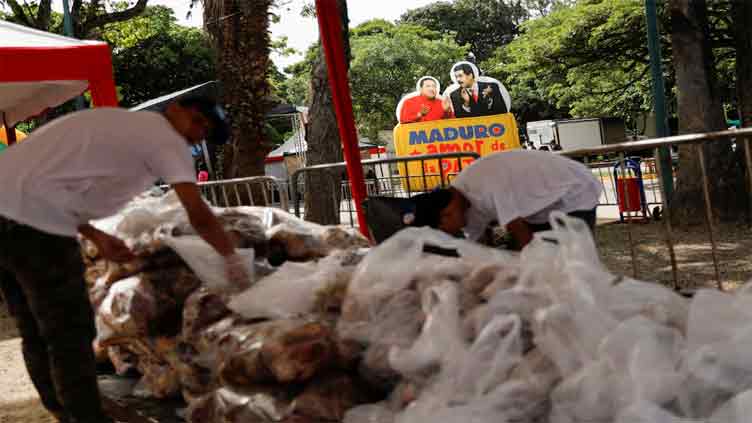Venezuela inflation down to 50pc from 130,000pc, but voters say they still can't make ends meet

Business
It is the lowest level since July 2012, as President Maduro seeks another term on Sunday
Expert says inflation could go down to zero, but there is a gap one earns $200 and basic food for a month is $500
CARACAS (Reuters) – The government of Venezuelan President Nicolas Maduro, who is seeking re-election on Sunday, has had some success in curbing formerly sky-high inflation, but workers say their salaries have not caught up with high prices for food and other goods.
That, combined with general frustration after years of economic malaise, could chill support for Maduro and help bring out the vote for opposition coalition candidate Edmundo Gonzalez, said voters and analysts.
Venezuela had suffered six-digit hyperinflation for about four years, with the indicator reaching a heady 130,000 per cent, eroding savings and making basic supplies scarce.
But annual inflation fell to around 50pc over the last year as the government restricted credit, held the exchange rate steady and curbed public spending.
"We have decelerated (inflation) with the correct policies," Maduro – who has been in power since 2013 – said this month when figures were published showing month-on-month inflation in June was 1pc.
The last time an inflation rise was that low was July 2012.
But many in the country are still struggling to make ends meet and some lamented that there had not been the usual boost in public sector pay seen in past election years.
"With the election, buying power isn't changed at all. Prices go up," said Oscar Reyes, a retired public sector worker whose pension is about $100 per month, as he shopped at a Caracas market.
Increases to his income had been minimal, he said. "We buy very little, because we also have to pay utilities."
Gonzalez has promised to broker deals between businesses, workers and the government to improve salaries and continue efforts to curb inflation.
"A few months ago, I was spending $75 a week on average on food, now it's double," said Carmen Morales, a 52-year-old administrator in the central city of Valencia, who earns $250 per month and helps support her parents.
Morales said she wants a change in government and will vote for the opposition on Sunday.
Given previous rises, current inflation reductions sometimes are not visible to the average consumer, analysts say.
"Inflation could go down to zero, but if you earn $200 and basic food for a month is $500, there is a gap," said economist Asdrubal Oliveros, director of Caracas-based consulting firm Ecoanalitica. "People don't see (lower) inflation as something positive."
The communications ministry and the central bank did not respond to requests for comment.
SUSTAINABLE MODEL?
Analysts say government spending has increased mildly during the election campaign. But salaries for public employees have not risen since 2022, though the government has increased bonuses, which have less fiscal effect.
Private sector salaries tend to be higher than in the public sector and average $231 per month, according to the Venezuela Finance Observatory. For private workers, too, raises have been less frequent than they were during hyperinflation, said consultancy Mercer Venezuela.
The government's inflation effort has required it to artificially hold the exchange rate for the local bolivar currency steady by injecting some $2.24 billion into the economy so far this year, about 30pc more than last year, according to calculations by analyst firm Sintesis Financiera.
Analysts say there will eventually have to be a price-stoking correction to the exchange rate, which has been held at 36.5 bolivars to the dollar for seven months.
The government's limiting of bank credit has forced producers of rice and corn, major crops for local consumption, to adopt forward-selling schemes with their buyers.
And business owners have frequently requested during meetings aired on state television that the government revise its fiscal and tax decisions, to help increase production and allow them to pay better salaries, to no avail.
Security guard Lisandro Gomez makes $40 a month plus bonuses and receives a subsidized government food basket.
"They say the economy is better, but I don't see it. What I earn doesn't go very far," he said - adding that he plans to back the opposition.


